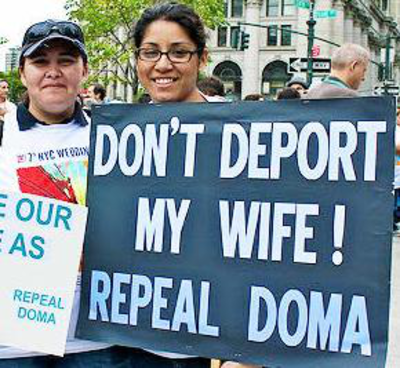by Moses Apsan, Esq.
A Manhattan immigration judge adjourned a deportation proceeding against Monica Alcota, the spouse of American citizen Cristina Ojeda in order to permit the U.S. immigration service to adjudicate a I-130, Petition for Alien Relative marking the first time a married, same-sex, couple has achieved such a triumph. Form I-130 is used by the USCIS for citizen or lawful permanent resident of the United States to establish the relationship to certain alien relatives who wish to immigrate to the United States. In this case the relative is a spouse.
The postponement of the her deportation proceedings was based on the emerging legal debate surrounding the constitutionality of the Defense of Marriage Act (DOMA). Currently married, heterosexual, couples are eligible under DOMA to apply for green card, but married same-sex couples are deprived of the same opportunity.
The couple’s attorneys, Noemi Masliah and Lavi Soloway contended that the couple’s marital status qualifies for permanent residency status. After the adjournment, Soloway discussed the judge’s decision to Gay City News and said:
“It is almost impossible to overstate the significance of what happened in there… An adjournment based on an I-130. It would never have happened a year ago. I don’t think I even would have filed it.”
Attorney Soloway says that if the couple’s DOMA challenge is ultimately unsuccessful he will argue, in the alternative, that asylum is required here due to a “provable fear of persecution” in her home country of Argentina.
Last year US District Court Judge Joseph L. Tauro in Boston knocked down the DOMA terms that bars federal recognition of legal same-sex marriages. He found that this section of DOMA violated the equal protection clause of the constitution and impermissible interfered with right of the state of Massachusetts to grant recognition under joint state-federal benefit programs.
The ruling was appealed by the Department of Justice to the 1st Circuit Court of Appeals, where the established precedent regarding claims of sexual orientation discrimination is that plaintiffs must show there is no rational basis for the difference in law they are challenging.
In Connecticut and New York , the courts in the 2nd Circuit when confronted with comparable lawsuits, where there is no existing precedent on anti-gay bias claims concluded that such claims should appropriately be held to a heightened level of scrutiny, and that under that type of review, DOMA’s constitutionality was not be justified.
The Department of Justice (DOJ), however, opined that there was a violation of the equal protection rights of same-sex couples. Attorney General Holder stated that would no longer defend DOMA in federal court.
It’s difficult to tell how long this case will last in court. If the USCIS denies the I-130 application, as it will probably do, there will be an appeal and the case will last for many years.
No matter what, it is the beginning of a new era for same sex marriage and the immigration service. Time will tell whether gay people will really be granted equiality to heterosexuals in America.

